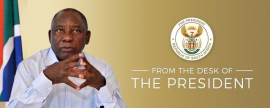
PRETORIA, May 30 (NNN-SANEWS) — President Cyril Ramaphosa has assured South Africans that government’s immediate priority is to end the cholera outbreak and ensure safe water for all.
In his weekly newsletter to the nation, the President said the recent outbreaks of cholera in Hammanskraal, Gauteng, and in the Free State have shown the importance of safe and effective water and wastewater management.
The cholera outbreak in Hammanskraal and the Free State has claimed 24 lives, while hundreds more have been hospitalised.
The President sent his condolences to those who lost their loved ones.
“Disease outbreaks such as the cholera outbreak in Hammanskraal are made far worse in situations of poor governance, weak management and poor maintenance of infrastructure. We have a responsibility and are determined to remedy those shortcomings in a sustainable way and as a matter of urgency,” Ramaphosa said.
He commended authorities for their efforts to speedily assist all those affected, including setting up a field hospital in Kanana in Hammanskraal, providing additional water tanking services to residents and going into communities to raise awareness about proper hygiene.
“An investigation is underway into the source of the outbreak. Technical teams from the City of Tshwane, the Department of Water and Sanitation, and the national and provincial Departments of Health are carrying out water quality tests at distribution points and at water treatment works in the area. They are also tracking and tracing infections.
“To date, the original source of the cholera infection has not been located. However, this waterborne disease is highly transmissible in conditions where there is inadequate access to clean water and sanitation facilities,” he said.
The President acknowledged that unreliable and poor quality drinking water has been a problem in Hammanskraal for many years.
He said the Rooiwal waste water treatment works, which is upstream of Hammanskraal, has not been well maintained and has insufficient capacity to deal with the volume of waste water entering the works.
The President highlighted that over the years, the Department of Water and Sanitation has issued many directives to the City of Tshwane to address pollution from Rooiwal. Regrettably, he said, these directives were not actioned.
Consequently, the department initiated legal action to force the City to use its grant from national government to refurbish and upgrade the waste water treatment works.
“While there must be full accountability for the failings that have resulted in the outbreak in Hammanskraal, at this time, we must focus on the problem at hand. We must stop the spread of cholera and take remedial measures to safeguard human health.
“Generally, water quality in South Africa is of a high standard, which, according to our Water Research Commission, ‘compares well with the best in the world’. It is important to note that the dual water systems supplied by Magalies and Rand Water to the Tshwane area meet national standards,” he said.
As we wait for the results of the investigation into the cholera outbreak in Hammanskraal, Ramaphosa said it is critical that local government authorities continue to work closely with national government to address and overcome the immediate challenges with water quality in Hammanskraal.
“It is encouraging that the City of Tshwane and the Department of Water and Sanitation are working together to ensure the various water supply systems meet drinking quality standards. Quality water and sanitation is fundamental to the dignity of every South African,” he said.
The President has asked the Minister of Water and Sanitation, Senzo Mchunu, to make recommendations to strengthen the governance, management and regulatory framework for municipal water and sanitation services.
This includes ensuring that national minimum norms and standards are comprehensive, adequately monitored and adhered to by all water service providers.
Turning to municipalities, the President bemoaned the fact that councils underspend critical infrastructure grants. He said this is unacceptable.
The Department of Water and Sanitation is working with municipal managers and technical teams across the country to ensure local councils use their water infrastructure grants effectively.
“Support is being provided, among others, to water infrastructure projects like the Nooitgedacht water transfer treatment scheme in Nelson Mandela Bay, the Greater Mbizana Regional Bulk Water Scheme in the Alfred Nzo District Municipality, and a number of projects in Maluti-a-Phofung in the Free State and Emfuleni and Midvaal Local Municipalities.
“National government and Umgeni Water are helping eThekwini metro to improve the management of its waste water treatment systems. Similarly, the Drakenstein municipality in the Western Cape and the Lekwa municipality in Mpumalanga are being helped to address waste water treatment system challenges,” he said.
As announced in the State of the Nation Address in February, the President reiterated that government is proceeding with a number of significant projects to improve the national bulk water resource infrastructure. — NNN-SANEWS






